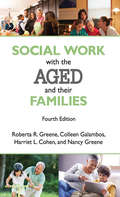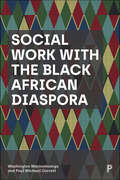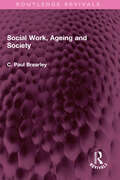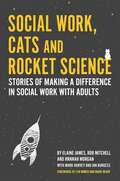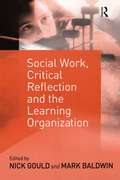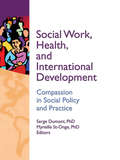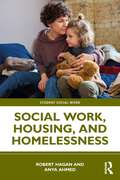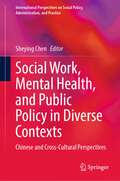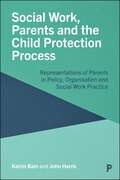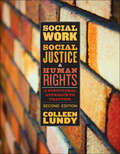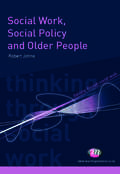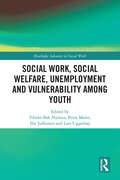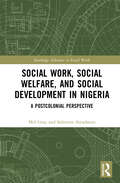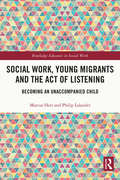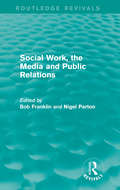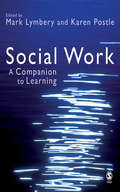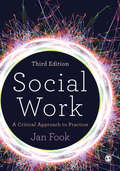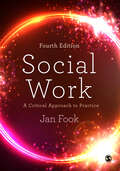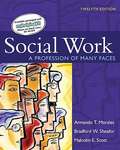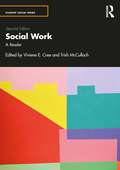- Table View
- List View
Social Work with the Aged and Their Families
by Roberta R. GreeneSocial Work with the Aged and Their Families presents the functional-age model (FAM) of intergenerational treatment, an integrative theoretical framework for social workers practicing with older adults and their families. In keeping with the Council on Social Work Education's curriculum mandate of 2015, social workers are now encouraged to use human behaviour theories in working with their geriatric clients. This fourth edition incorporates much-needed additional techniques to address the mental health assessments of the elderly. FAM addresses the assessment of older adults' biological, psychological, socio-cultural, and spiritual age. It also incorporates an evaluation of the family system, family roles, and family development in this assessment. Interventions at the individual, family, group, and community levels are discussed. This volume, augmented with recent concepts related to successful aging, spirituality, and resiliency, presents the major converging conceptual trends that constitute a model for twenty-first century social work practice in the field of aging. It is an indispensable text for those training in social work practice with the elderly, or those currently in practice.
Social Work with the Black African Diaspora
by Paul Michael Garrett Washington MarovatsangaSocial work education and interventions with Black African families are frequently impaired because of discrimination, racism and the structuring priorities of neoliberalism. Rooted in rich and fascinating empirical work with practitioners and educators, this urgent, scholarly and accessible book emphasises that ‘Black Lives Matter’. Intent on nurturing more progressive and pluralistic practices in pedagogy and practice, the book is a timely and significant contribution seeking to remake social work approaches to issues of ‘race’, racism and social justice.
Social Work, Ageing and Society (Routledge Revivals)
by C Paul BrearleyFirst published in 1975, Social Work, Ageing and Society provides a basic understanding of the needs of older people in society. It deals with the role of the old person in society and attitudes to old age, as well as the physical, emotional and social needs of the ageing individual. It shows that material resources and social work skills can make a great deal of difference to the quality of life and health of elderly citizens, and is concerned therefore not only with the process of ageing but also with the validity of techniques of social intervention against a background of limited practical resources for the elderly. This book will be of interest to social work students and to members of other caring professions.
Social Work, Cats and Rocket Science: Stories of Making a Difference in Social Work with Adults
by Hannah Morgan Elaine James Rob MitchellThis book tells stories of just how powerful social work can be. At its heart are stories drawn from frontline practice, ranging from first interviews through to complex decision-making. Along the way, we meet the social worker who assessed a cat (though for all the right reasons). We witness the cost of failing to protect the rights of adults, exemplified in the tragic death of Connor Sparrowhawk. We also see the transformations that can happen when social workers really get it right - as in the case of Peter, whose love of balloons led them to feature in his care plan. These stories from practice are combined with guidance and reflective exercises to offer valuable practice wisdom and learning for new and experienced social workers alike. By turns funny, wise and moving, this book articulates the personal and professional qualities needed to practise rights-based social work. It reveals the potential of the profession to make a difference to the lives of individuals and to communities.
Social Work, Critical Reflection and the Learning Organization
by Mark BaldwinA critical characteristic of human service organizations is their capacity to learn from experience and to adapt continuously to changing external conditions such as downward pressure on resources, constant reconfiguration of the welfare state and rapidly changing patterns of social need. This invaluable, groundbreaking volume discusses in detail the concept of the learning organization, in particular its relevance to social work and social services. Contributors join together from across Europe, North America and Australia to explore the development of the learning organization within social work contexts and its use as a strategic tool for meeting problems of continuous learning, supervision and change. The volume addresses a range of important topics, from strategies for embedding learning and critical reflection in the social work learning organization, to the implications of the learning organization for the new community-based health and social care agenda.
Social Work, Health, and International Development: Compassion in Social Policy and Practice
by Serge Dumont Myreille St-OngeSharpen your social work in health care knowledge and skillsSocial Work, Health, and International Development: Compassion in Social Policy and Practice presents leading international experts from a range of disciplines providing the latest in research, theory, and practical solutions to advance social work in health care issues. Readers get a refreshed view on ways to put social policy into a compassionate and empathetic framework with strategies to more effectively meet today's challenges in social work and health care. This superb selection of papers from the Fourth International Conference on Social Work in Health and Mental Health held in Quebec provides a unique perspective on social work and the development of a more compassionate world.Social Work, Health, and International Development: Compassion in Social Policy and Practice focuses on areas essential to every social worker no matter where they practice. The book explores the increased importance of compassion and solidarity among social workers, the essential need to effectively address the HIV/AIDS pandemic, strategies to more fully address aging issues, and best practices. The latest research findings and data are discussed to modify approaches and revitalize the field, all to help the world become a more caring, compassionate place.Topics in Social Work, Health, and International Development: Compassion in Social Policy and Practice include: social work interventions to lead needy countries from health to economic growth the concept of solidarity as a fundamental notion in social work the need to revisit social work’s ethical foundations cultural competence in responding to the HIV/AIDS pandemic a comprehensive action plan to deal with HIV/AIDS a study on grandparents’ caring for children of AIDS victims multilevel interventions to promote elderly people’s mental health forming partnerships that promote the diverse voices of older people recognizing deficiencies to increase cultural competency in staff “best practice” case management approach to improve patient adherence to care Internet-based intervention for caregivers of persons with dementia dyadic peer support pilot intervention for parents of children with lung disease continual education for increased professional competence much more!Social Work, Health, and International Development is invaluable reading for social workers, health practitioners, researchers, and clinicians.
Social Work, Housing, and Homelessness (Student Social Work)
by Anya Ahmed Robert HaganShelter is a basic human requirement, yet housing in the UK has increasingly been perceived as an asset rather than the secure base everyone requires for their basic physical and mental health needs and well-being.This book examines how all types of housing have become precarious for many service users with whom social workers will engage and makes some suggestions regarding action and best practice. Showing how people become homeless and the difficulties finding a way out of this, the housing options for specific populations including care leavers, those with disabilities, families, and older people will be examined. All this will be framed in the context of social work practice, building practitioner knowledge and confidence around an area that affects everyone but the significance of which is sometimes underexamined in holistic assessments. Packed with reflective examples and case studies, each chapter also includes a "tuning in" exercise to help prepare the reader for what the chapter will tackle, with concluding thoughts on these exercises at the chapter end.This book is suitable for both undergraduate and postgraduate social work students as they begin to think of more specialised areas of work in their second or subsequent years, as well as social work practitioners, who will be increasingly aware of the pressures of housing costs on those with whom they work.
Social Work, Immigration and Asylum: Debates, Dilemmas and Ethical Issues for Social Work and Social Care Practice
by Chris Brown Debra Hayes Beth HumphriesThe practical and ethical challenges facing human service professionals working with refugees, asylum seekers and other people subject to immigration controls are discussed in this much-needed book. The contributors explore the tensions that exist between traditional anti-oppressive values and the role professionals increasingly play as 'gate keepers' to services. Drawing from the experience of practitioners working in child protection and family support, disability, the criminal justice system, asylum teams and immigration tribunals, Social Work, Immigration and Asylum will prepare professionals working in these and related fields to deal with the complex situations of people subject to immigration control and to develop interventions appropriate to their differing needs.
Social Work, Law and Ethics (Student Social Work)
by Jonathan DickensLaw and ethics are two vital aspects of social work – all social workers need to practise according to the law and their codes of ethics and conduct. However, the relationship between the law and social work values and ethics is not without its tensions and this book takes a problem-based approach to explore the dilemmas and challenges that can arise. The first part of the book sets out frameworks for thinking about the law and ethics, and how they relate to social work. It also introduces some of the big philosophical and sociological questions about the purposes of law and of ethics and how they relate to society more generally. In the second part, the book explores a series of areas where profound dilemmas arise – such as end-of-life decisions, respecting peoples’ choices but ensuring their safety and that of others, responsibility and blame, making allowance for different cultural traditions and breaking confidentiality. In each of the problem-based chapters, this accessible text: outlines the relevant law discusses court judgments in leading cases considers the implications of different ethical frameworks pulls out key ethical questions and challenges for social work. Social Work, Law and Ethics highlights what the law says and what it offers, what ethical principles are at stake, and what these imply for social work policy and practice. In this way, it uses real-life scenarios to analyse the dynamic interactions of social work, law and ethics. It is essential reading for all social work students.
Social Work, Mental Health, and Public Policy in Diverse Contexts: Chinese and Cross-Cultural Perspectives (International Perspectives on Social Policy, Administration, and Practice)
by Sheying ChenThe discipline of social policy, oftentimes deemed a part of social work as a profession, was born in the West. Unlike social policy that started with the post-war idea of a welfare state in the mid-20th century, social work traces its roots to individual casework pioneered by the Charity Organization Society (COS), early social administration including state-wide poverty relief (an advocacy effort of the COS but with deep roots in the English Poor Laws of the 17th century), and social action emphasizing political activities to improve social conditions (originating from the Settlement House Movement which began in the 1880s).The development of social work is historically intertwined with that of public welfare, philanthropy, and charity and is an inherently international subject. This conception is broader than “international social work” as a discrete field of professional practice, which crosses geopolitical borders and all levels of social and economic organizations with a focus on development. However, each nation has a story of its own in terms of professionalization of social work in the evolution of public welfare and philanthropic/charitable undertaking within its particular economic, political, social, and cultural settings. A wide-ranging and in-depth study of various (especially non-Western) country cases is essential to an adequate, comprehensive understanding of the social work profession, which is also a basic requirement of its value of diversity.China is undoubtedly an important case with the largest population on earth. It’s also unique in view of so-called Chinese characteristics which are sometimes fundamentally different from other (particularly Western) societies. It’s even intriguing given the country’s lengthy, complex history and its recent, rapid rise to a global superpower with a claim of national goals and core values that seem to be rather considerable to social work as a helping profession. Therefore, any significant lessons learned from the Chinese experiences would help with a better international understanding and further advancement of social work and public welfare at a global scale.
Social Work, Parents and the Child Protection Process: Representations of Parents in Policy, Organisation and Social Work Practice
by John Harris Katrin BainDespite the pivotal role played by parents in the child protection process, little attention has been paid to how social workers perceive them. Exploring representations of parents within Children’s Services – at the levels of policy, organisation and frontline practice – the concept of citizenship is used to construct a typology with ten variants of parent-citizenship. The typology reveals the complexities of parental representations and their relationship to the content of policy, organisational environments and dominant societal themes, as it uncovers how social workers represent parents in their day-to-day practice. The book is a resource that can be used by students, practitioners, researchers and parent advocacy organisations to evaluate policy and practice and to contribute to the search for the best possible outcomes for families. Arguing that parental participation in the child protection process is essential, the book increases the visibility of parents and contributes to a much-needed dialogue about working with parents in Children’s Services.
Social Work, Psychiatry and the Law: Second Edition (Routledge Revivals)
by N.N. Pringle P.J ThompsonFirst published in 1999, this volume is a revision of an earlier edition, after which there has been a virtual transformation in the provision of mental health services, examining issues including disturbances in children and adolescents, severe and enduring mental illness, drugs, ethical issues and developing a psychotherapeutic approach to approved social work. Many asylums have been closed, community care has been introduced and law, policy and practice have necessitated institutional change although, at an operational level, resources and perceptions have not always kept pace with change, resulting in increased levels of stress and, sometimes, public tragedy. This revision attempts to reconsider these changes from a social work perspective, along with contributing to the debate on professional and interprofessional practice.
Social Work, Social Justice, and Human Rights: A Structural Approach to Practice, Second Edition
by Colleen LundySocial workers take pride in their commitment to social and economic justice, peace, and human rights, and in their responses to related inequalities and social problems. At a time when economic globalization, armed conflict, and ecological devastation continue to undermine human rights and the possibilities for social justice, the need for linking a structural analysis to social work practice is greater than ever. The second edition of this popular social work practice text more fully addresses the connection between social justice and human rights. It includes a discussion of social work's role in promoting peace and responding to environmental problems. It also places a greater attention on the links between social work theories/concepts and practice skill/responses. The text has been updated and revised throughout with four new chapters: social work and human rights, cultural competence and practice with immigrant communities, social work and mental health communities, and practice with couples and families. Detailed case studies demonstrate the integration of theory, policy, and practice.
Social Work, Social Policy and Older People (Thinking Through Social Work Series)
by Robert JohnsIt is essential for social work students to know about social policy, to know why studying social policy is important in the social work degree, and to understand how social policy, when implemented, has a real impact on the everyday life of vulnerable people. This book provides plenty of examples of this impact, tracing the development of welfare provision for older people right through the twentieth century, leading up to an analysis of contemporary developments, which students will need to know about in order to practice effectively.
Social Work, Social Welfare, Unemployment and Vulnerability Among Youth (Routledge Advances in Social Work)
by Ilse Julkunen Lars Uggerhøj Vibeke Bak Nielsen Petra MalinSocial Work, Social Welfare, Unemployment and Vulnerability Among Youth critically analyses contemporary welfare state interventions on unemployment and poverty among youth in a context of societal transformation. It also considers how we can develop future knowledge and methods in evolving welfare institutions. Young people constitute a group that is particularly exposed to high unemployment, identity and future uncertainties, economic difficulties, educational and housing challenges. Experiences from social work and research have shown that young people often face multiple issues which are often interlinked. In social work this is a challenge owing to little knowledge on the most pressing needs of different groups – seen from the perspective of the young people themselves. The authors focus on the tension points in practice and examine policy developments around young people and welfare dynamics based on discussions and research in the Nordic countries and beyond. In doing so, this book connects research-based knowledge with the challenges social workers meet in their everyday practices. It will be of interest to all scholars, students and professionals working within the following fields: social work, social policy, child and youth studies and sociology.
Social Work, Social Welfare, and Social Development in Nigeria: A Postcolonial Perspective (Routledge Advances in Social Work)
by Mel Gray Solomon AmadasunThis groundbreaking book provides a comprehensive account of social work, social welfare, and social development in Nigeria from a postcolonial perspective. It examines the historical development of social work and social welfare and the colonial legacies affecting contemporary social welfare provision, development planning, social work practice, and social work education. Against this historical backdrop, it seeks to understand the position of social work within Nigeria’s minimalist structure of welfare provision and the reasons why social work struggles for legitimacy and recognition today. It covers contexts of social work practice, including child welfare, juvenile justice, disabilities, mental health, and ageing, as well as areas of development-related problems and humanitarian assistance as new areas of practice for social workers, including internally displaced and trafficked people, and their impact on women and children. It seeks to understand Nigeria’s ethnoreligious diversity and indigenous cultural heritage to inform culturally appropriate social work practice. This book offers a global audience insight into Nigeria’s developmental issues and problems and a local audience – social science and human service researchers, educators, practitioners, students, and policymakers ‒ a glimpse of what’s possible when people work together toward a common goal. It will be of interest to all scholars and students of social work, development studies and social policy.
Social Work, Young Migrants and the Act of Listening: Becoming an Unaccompanied Child (Routledge Advances in Social Work)
by Marcus Herz Philip LalanderThis book is about 20 young unaccompanied refugees who have sought refuge in Europe and how they experience and try to navigate their new situations, including their contacts with social workers, friends and family members left behind. The book contains stories of powerlessness and frustration from being held under suspicion, from meeting authorities and abstract people of power from "the system," or from constantly being categorized in a static category of "the unaccompanied child." It contains stories of human meetings characterized by thoughtfulness, reciprocity and listening. This book also explores the experiences of meeting social workers as a young migrant in Sweden. The narratives depict how social workers can often reproduce powerlessness and frustration among the young people, but also how there are those social workers who provide something else through the act of listening. By extension, this is a book about society, about how important it can be to reframe people and to listen to their stories, needs and wills. Demonstrating the importance of listening to the stories of young refuges, this title will appeal to students, researchers, community workers and social workers interested in migration, race and ethnicity, youth studies, social work, sociology, anthropology, pedagogy and health.
Social Work, the Media and Public Relations (Routledge Revivals)
by Bob Franklin Nigel PartonOver the past few decades, relationships between social workers and the media have become increasingly challenging. Social workers feel aggrieved by media reporting of their profession and believe that journalists lack sufficient knowledge and experience of the social services to report matters adequately and sensitively, whilst some journalists have urged social workers to adopt a more proactive public relations strategy. This book, first published in 1991, analyses the causes and consequences of the negative portrayal of social work within the media and considers various ways in which this image might be improved. The authors consider a variety of developments during the 1990s designed to redress imbalances in media reporting and present a more accurate picture of social workers and the people with whom they work. This title remains very relevant in light of the high profile cases related to the social service that continue to feature in the British press, and will be of particular value to students and researchers with an interest in the relationship between the media and social policy.
Social Work: A Companion to Learning
by Karen Postle Mark Lymbery′This engaging and stimulating book is well placed to become a key text in many student social workers′ redaing lists′ - Journal of Interprofessional Care `[An] excellent book, abounding with conceptual insights, bursting with research and evidence-based reasoning, and pretty comprehensive in the spread of topics. [It] contains plenty of though-provoking material in nice sized chunks that challenged me to think about my practice in different ways and also made me want to find out more. The range of contributors is impressive and students could do a lot worse than digest and reference their work in assignments′ - Professional Social Work `a comprehensive account of the issues related to social workers′ personal development and latest developments in social work practice. I have no doubt that this book will provide an invaluable reference guide for social workers who are interested in the development of the profession′ - Social Policy and Social Work (SWAP) `[This] book is put together in an accessible and engaging way, which serves to stimulate the reader by posing questions, and creating opportunities for reflecting on the key learning points of each chapter. [It] should be an essential reading item on the book list of every social work student and act as a training resource to those training future social workers, and those already established within the profession′ - Health & Social Care in the Community `In recent years, social work has been devalued by politicians and the media. However it requires practitioners equipped with key skills to empower individuals and communities and rooted in values which stimulate them to promote social justice. It is heartening that social work educators are at the forefront of equipping social workers with the skills and values to promote a better society. This book will open hearts and minds to achieve these ends′ - Bob Holman, former Community Worker and Professor of Social Policy Social Work: A Companion to Learning is an exciting and definitive new book that will equip readers with the core knowledge and skills they need to successfully complete their social work training, and go on to be an effective practitioner. The text takes a holistic and critical approach, not only enabling students and practitioners to understand how to practise social work effectively, but also how to locate this practice within its societal context. Written and edited by leading experts in the field, each chapter skilfully explores key themes, issues, and concepts underpinning social work theory and practice in an engaging, authoritative and accessible way. The selection of topics serves to establish: - the contexts through which social work education can best be understood - the core requirements and processes that characterise social work courses - the issues involved in continuing professional development. The chapters comprise a wide range of key issues, such as communication skills, partnership working, the values of social work, supervision, management, law, and research mindedness, as well as two unique chapters written exclusively from service users′ perspectives. Case studies, interactive questions, key points and further reading sections are used throughout the book to bring the material to life and aid readers′ understanding. Social Work: A Companion to Learning will be a core text for students and practitioners at all levels, providing the most up-to-date and comprehensive companion they will need to help them progress in their careers. Mark Lymbery has taught social work at the University of Nottingham since 1995. He is the author of Social Work with Older People (2005), also published by SAGE. Karen Postle is a lecturer in social work at the University of East Anglia. Both authors have a background as social work prac
Social Work: A Critical Approach to Practice
by Jan FookSocial work is a human profession founded on social justice. It is difficult, however, to negotiate this in the constantly changing context of the 21st century. Drawing on her own experiences and the experiences of others, Jan Fook returns to address the critical tradition of social work, supporting students in their understanding of the possibilities of critical practices in changing contexts. Part One: Critical Potential and Current Challenges sets the historical and current contexts for critical social work, introducing students to what critical social work is and what it means for practice. Part Two: Rethinking Ideas unpicks the major concepts associated with critical social work, including knowledge, power, discourse, identity, and difference, and how these need to be rethought in new contexts. Part Three: Redeveloping Practices illustrates how these new ideas can inform new practices, proving students with all the tools you need to deliver flexible, responsible and responsive social work practice. Celebrating the ageless ideals of the profession, this book throws a life belt to all social work students and professionals looking to engage with the critical tradition of social work to improve their understanding and practice. Jan Fook is Visiting Professor of Professional Practice Research, Royal Holloway, University of London and Chair in Education (Critical Reflection), Kingston University and St Georges, University of London
Social Work: A Critical Approach to Practice
by Jan FookNow 20 years since its first publication, Jan Fook returns to update her seminal text. Celebrating the ageless ideals of the profession, this book throws a life belt to all social work students and professionals looking to engage with the critical tradition of social work to improve their understanding and practice. Part One: Critical Potential and Current Challenges sets the historical and current contexts for critical social work, introducing you to what critical social work is and what it means for practice. Part Two: Rethinking Ideas unpicks the major concepts associated with critical social work, including knowledge, power, discourse, identity, and difference, and how these need to be rethought in new contexts. Part Three: Redeveloping Practices illustrates how these new ideas can inform new practices, proving you with all the tools you need to deliver flexible, responsible and responsive social work practice.
Social Work: A Critical Approach to Practice
by Jan FookNow 20 years since its first publication, Jan Fook returns to update her seminal text. Celebrating the ageless ideals of the profession, this book throws a life belt to all social work students and professionals looking to engage with the critical tradition of social work to improve their understanding and practice. Part One: Critical Potential and Current Challenges sets the historical and current contexts for critical social work, introducing you to what critical social work is and what it means for practice. Part Two: Rethinking Ideas unpicks the major concepts associated with critical social work, including knowledge, power, discourse, identity, and difference, and how these need to be rethought in new contexts. Part Three: Redeveloping Practices illustrates how these new ideas can inform new practices, proving you with all the tools you need to deliver flexible, responsible and responsive social work practice.
Social Work: A Critical Approach to Practice
by Professor Jan FookSocial work is a human profession founded on social justice. It is difficult, however, to negotiate this in the constantly changing context of the 21st century. Drawing on her own experiences and the experiences of others, Jan Fook returns to address the critical tradition of social work, supporting students in their understanding of the possibilities of critical practices in changing contexts. Part One: Critical Potential and Current Challenges sets the historical and current contexts for critical social work, introducing students to what critical social work is and what it means for practice. Part Two: Rethinking Ideas unpicks the major concepts associated with critical social work, including knowledge, power, discourse, identity, and difference, and how these need to be rethought in new contexts. Part Three: Redeveloping Practices illustrates how these new ideas can inform new practices, proving students with all the tools you need to deliver flexible, responsible and responsive social work practice. Celebrating the ageless ideals of the profession, this book throws a life belt to all social work students and professionals looking to engage with the critical tradition of social work to improve their understanding and practice. Jan Fook is Visiting Professor of Professional Practice Research, Royal Holloway, University of London and Chair in Education (Critical Reflection), Kingston University and St Georges, University of London
Social Work: A Profession of Many Faces
by Armando Morales Bradford Sheafor Malcolm ScottThis best-selling text continues to offer a comprehensive introduction to the field of social work with a unique focus on the diverse groups to whom social workers provide services; including children, older adults, disabled persons, and members of minority racial and ethnic groups. <P><P>It covers the emergence of the profession of social work, career oportunities for social workers, and the values and competencies required of social workers. <P><P>Timely issues that this edition addresses include the following: the events of 9/11 and their dramatic influence on human services in the United States; the United States involvement in Middle East warfare; the physical and emotional damage to individuals involved in Middle East warfare; and the 2000 Census---how substantial changes in the U.S. population suggest a need for realignment of social services.
Social Work: A Reader (Student Social Work)
by Viviene E. Cree Trish McCullochBuilding on the successful 1st edition, this reader brings together some of the most significant ideas that have informed social work practice over the last fifty years. At the same time as presenting these foundational extracts, the book includes commentaries that allow the reader to understand the selected extracts on their own terms as well as to be aware of their relations to each other and to the wider social work context. There is no settled view or easy consensus about what social work is and should be, and the ideas reflected in this volume are themselves diverse and complex. The world of social work has changed greatly over the last ten years, and this new edition reflects that change with new material on the decolonisation of social work knowledges, the greater emphasis on inter-disciplinarity and co-production and the new concern for identities. With an accessible introduction to contextualise the selections, the book is divided into three main sections, each presenting key texts drawn from a wide range of perspectives: psychological, sociological, philosophical, educational and political, as well as perspectives that are grounded in the experiences of practitioners and those who use services, which have contributed to the development of: • the profession of social work, • knowledge and values for social work and• practice in social work. By providing students and practitioners with an easy way into reading first-hand some of the most interesting, foundational texts of the subject, it will be required reading for all undergraduate and postgraduate programmes and professionals undertaking post-qualifying training.
